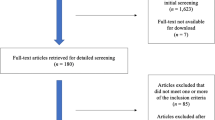Abstract
Paper–pencil teacher tests of professional knowledge typically are organized around the conventional dimensions that define state teaching standards, such as classroom management and assessment. We examined if such tests could be partitioned into three other dimensions (general knowledge, academic or textbook knowledge, and functional teaching knowledge), and if these dimensions (1) identified between those who did and did not receive teacher preparation, and (2) predicted teaching competence. A teacher test was given to advanced and beginning education majors, and non-majors. We found that advanced education majors and non-majors differed mostly on academic knowledge, but that functional knowledge predicted competence to the greatest extent. A variety of useful information can be gleaned from teacher tests if subscores of these dimensions are generated.


Similar content being viewed by others
References
American Educational Research Association, American Psychological Association, & National Council on Measurement in Education (1999). Standards for Educational and Psychological Testing. Washington, DC; American Educational Research Association.
Ayers, J.B. (1988). Another Look at the Concurrent and Predictive Validity of the National Teacher Examinations. Journal of Educational Research 81, 133–137
Ayers, J.B. & Qualls, G.S. (1979). Concurrent and Predictive Validity of the National Teacher Examinations. The Journal of Educational Research 73, 86–92
Berliner, D. (2005). The Near Impossibility of Testing for Teacher Quality. Journal of Teacher Education 56, 205–213
Blue, T.W., O’Grady, R.J., Toro, J.A. & Newell, E.A. (2002). How do we Find the Best Teachers? A Study of the Relationships Among SAT, GPA, Praxis Series Test Scores, and Teacher Ratings. Paper presented at the annual meeting of the Association of Teacher Educators, Denver, CO.
Cochran-Smith, M. & Zeichner, K.M. (ed.) (2005). Studying Teacher Education. The Report of the AERA Panel on Research and Teacher Education.. Mahwah, NJ: Lawrence Erlbaum.
Cronbach, L.J. & Meehl, P.E. (1955) Construct validity in psychological tests. Psychological Bulletin 52, 281–302
Cubberley, E.P. (1906). The certification of teachers. In M.J. Holmes (ed.), The Fifth Yearbook of the National Society for the Scientific Study of Education (pp. 5–88). Chicago: University of Chicago Press.
Danielson, C. (1996). Enhancing Professional Practice: A Framework for Teaching. Alexandria, VA; Association for Supervision and Curriculum Development.
Darling-Hammond, L. (1986). Teaching Knowledge: How Do We Test It. American Educator 10(3), 18–21, 46
Darling-Hammond, L., Wise, A.E. & Klein, S.P. (1995). A License to Teach: Building a Profession for 21st-century Schools. Boulder, CO; Westview.
Dobry, A.M., Murphy, P.D. & Schmidt, D.M. (1986). Predicting Teacher Competence. Action in Teacher Education 7, 69–74
Gorth, W.P. & Chernoff, M.L. (1986). Introduction. In W.P. Gorth & M.L. Chernoff (eds.), Testing for Teacher Certification (pp. 1–13). Hillsdale, NJ: Lawrence Erlbaum.
Haertel, E.H. (1991). New forms of teacher assessment. In G. Grant (ed.), Review of Research in Education, volume 17 (pp. 3–29). Washington, DC: AERA.
Haney, W., Madaus, G. & Kreitzer, A. (1987). Charms talismanic: Testing teachers for the improvement of American education. In E.Z. Rothkopf (ed.), Review of Research in Education, volume 14 (pp. 169–238). Washington, DC: AERA.
Hu, L. & Bentler, P.M. (1999). Cutoff Criteria for Fit Indexes in Covariance Structure Analysis: Conventional Criteria Versus New Alternatives. Structural Equation Modeling: A Multidisciplinary Journal 6(1), 1–55
Kane, M.T. (1992). An Argument-Based Approach to Validity. Psychological Bulletin 112, 527–535
Kane, M.T. (1994). Validating Interpretive Arguments for Licensure and Certification Examinations. Evaluation and the Health Professions 17, 133–159
LISREL (2004). Version 8.71 [Computer software]. Lincolnwood, IL: Scientific Software International.
Lovelace, T. & Martin, C.E. (1984). The Revised Teacher Examinations as a Predictor of Teachers’ Performance in Public School Classrooms. Final Report of Funded Project, FY ‘83–84. (ERIC Document Reproduction Service No. ED 251416)
Merwin, J.C. (1978). Review of the National Teacher Examination. In O.K. Buros (ed.), The Eight Mental Measurements Yearbook, Volume 1 (pp. 514–516). Highland Park, NJ: Gryphon Press.
Miller, M.D., Poggio, J.P. & Glasnapp, D.R. (1987). Teachers’ Professional Knowledge: Are We Measuring Acquired Skills or Common Knowledge. Journal of Personnel Evaluation in Education 1, 57–68
Moore, D., Schurr, K.T. & Henriksen, L.W. (1991). Correlations of National Teacher Examination Core Battery Scores and College Grade Point Average with Teaching Effectiveness of First-Year Teachers. Educational and Psychological Measurement 51, 1023–1028
National Research Council (2001). Testing Teacher Candidates: The Role of Licensure Tests in Improving Teacher Quality. Washington, DC; National Academy Press.
Nelson, E.A. (1985). Review of NTE programs. In J.V. Mitchell Jr. (ed.), Ninth Mental Measurements Yearbook (Volume 2, pp. 1187–1188). Lincoln, NB: University of Nebraska Press.
Porter, A.C., Young, P. & Odden, A. (2001). Advances in teacher assessments and their uses. In V. Richardson (ed.), Handbook of Research on Teaching, 4th edition (pp. 259–297). Washington, DC: AERA.
Quirk, T.J., Witten, B.J. & Weinberg, S.F. (1973). Review of studies of the concurrent and predictive validity of the national teacher examinations. Review of Educational Research, 43(1), 89–113
Reynolds, A., Tannenbaum, R.J. & Rosenfeld, M. (1992). Beginning Teacher Knowledge of General Principles of Teaching and Learning: A National Survey. Princeton, NJ; Educational Testing Service(ERIC Document Reproduction No. 385 570).
Sandefur, J.T. (1985). State Assessment Trends. Washington, DC; American Association of Colleges of Teacher Education.
Shannon, D.M., Medley, D.M. & Hays, L. (1993). Assessing Teachers’ Functional Professional Knowledge. Journal of Personnel Evaluation in Education 7, 7–20
Shulman, L.S. (1987). Knowledge and Teaching: Foundations of the New Reform. Harvard Educational Review 57, 1–22
Wainer, H., Sheehan, K.M. & Wang, X. (2000). Some Paths Toward Making Praxis Scores More Useful. Journal of Educational Measurement 37, 113–140
Acknowledgement
This research was funded by a National Academy of Education/Spencer Postdoctoral Fellowship awarded to the first author. We also would like to thank the manuscript reviewers for constructive comments regarding interpretation of the confirmatory factor analysis results.
Author information
Authors and Affiliations
Corresponding author
Rights and permissions
About this article
Cite this article
D’Agostino, J.V., VanWinkle, W.H. Identifying Prepared and Competent Teachers with Professional Knowledge Tests. J Pers Eval Educ 20, 65–84 (2007). https://doi.org/10.1007/s11092-007-9047-2
Received:
Accepted:
Published:
Issue Date:
DOI: https://doi.org/10.1007/s11092-007-9047-2




